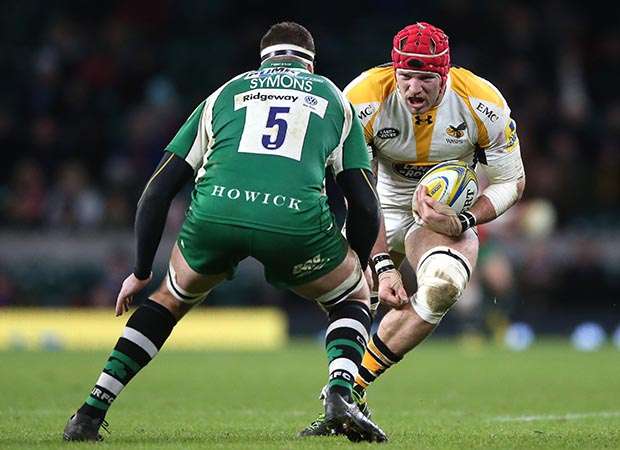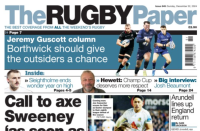 I had an interesting letter this week from Jeff Gage who often corresponds with The Rugby Paper. In his letter, he agreed with a number of points that I had highlighted in my last article but also made some points of his own, not least the damaging effect on the England national side being totally dependent on just the 12 Premiership clubs.
I had an interesting letter this week from Jeff Gage who often corresponds with The Rugby Paper. In his letter, he agreed with a number of points that I had highlighted in my last article but also made some points of his own, not least the damaging effect on the England national side being totally dependent on just the 12 Premiership clubs.
He pointed out that most Premiership clubs would not be any stronger than their counterparts in the Southern Hemisphere, not the Super Rugby teams but the actual clubs like Randwick in Australia, Ponsonby in New Zealand and Villagers in South Africa.
The difference between Southern Hemisphere clubs and the Premiership is purely how players progress to international level rugby.
In the South, the players have to achieve at a number of representative levels before making international, whilst here they are picked straight from the clubs, something that I have often said is wrong with our current system and, as he points out, gives a clue as to why those countries achieve more from a smaller playing resource.
With at least 30 per cent of foreign non-English qualified players in such a small number of clubs influencing the performance of all players in the teams, it makes measured selections almost impossible.
Whereas, the Southern Hemisphere clubs, who also have a number of foreign players, lose their national-qualified players to provincial sides where the players have to prove themselves to progress further up the ladder towards the international game.
Unlike England, where the national coach is only allowed to pick players that ply their trade in the Premiership twice a year, an agreement forced on the RFU by Premiership Rugby Limited in the early days of professionalism, the Southern Hemisphere coaches can pick from almost every level of their game as often as they like, effectively giving them a larger pool of potential players than the RFU.
It’s not the number of foreign players that is the problem, as the Southern clubs have had a number from this hemisphere, not least Martin Johnson in New Zealand, it’s just the selection policy.
In fact, the latest England hopeful, the London Irish lock Matt Symons, has just got back from such a sojourn and has made a damning comment about player development in this country.
Symons spent time with the Saracens academy but was rejected as an 18-year-old, so went off and started rowing only to be injured, then returned to rugby with Esher before heading South to gain experience and a professional career, which he achieved eventually with the Chiefs.
Symons said he had to make that journey as there is no automatic route to the professional game here for late developers – and that struck a chord with me.
As a 15-year-old I had an England trial (nowadays that would guarantee me a place in an academy) but like so many young men, I didn’t grow much between the ages of 15 and 18 and certainly not enough to be selected as a modern day prop forward.
At 5ft 10in and 16st when 18 there is no way that any of the Premiership clubs would have offered me a contract nowadays, even though I did have an invitation to join Harlequins that I turned down to continue learning my trade as a prop at Old Albanians where I was a first team player.
By the age of 20, I had played for Hertfordshire county and was ready to move up the club ladder, first to Streatham and Croydon where I also played for Surrey Clubs. Then aged 24 to my first senior club, Richmond, where I played for both Middlesex and Surrey county teams, London clubs and London Division. At age 28 I joined Wasps and played first team, Surrey county and Divisional rugby and the following year I was in the England squad but it took another three years before I was selected for England.
This is a journey that can no longer be made by any player because virtually all English-born professional players come through the academy system.
This is a system that vacuums up all the young county players and then discards the vast majority of them three years later. Some, if they are lucky, will get the chance of playing in the Championship with the slim hope that offers a possible Premiership call-up but for the majority it will mean an end to their dreams of being a professional rugby player.
What makes that even worse is only a tiny minority of young players will ever make it to U15 representative rugby and unless those that don’t make it are extremely lucky, they have virtually no chance of becoming a professional player.
Symons at least had time in an academy system before being rejected and that experience would have helped him find a place in a team like Esher that has a semi-professional culture but it was his own determination that took him to New Zealand and eventual success.
There is no doubt that he could have stayed in New Zealand and become qualified to play for them but he has chosen to return home and fight for a place in the England side. He has had to prove himself at every step on his journey from Saracens failure to Super Rugby success.
Eddie Jones has been told in no uncertain terms that central contracts will not happen and the clubs will always control his players.
So, unless the RFU takes heed of the comments that say there must be a level between club and country, England will, as Brian Moore also recently said, have to be content with no more than spasmodic success against the Southern Hemisphere Big Three.























